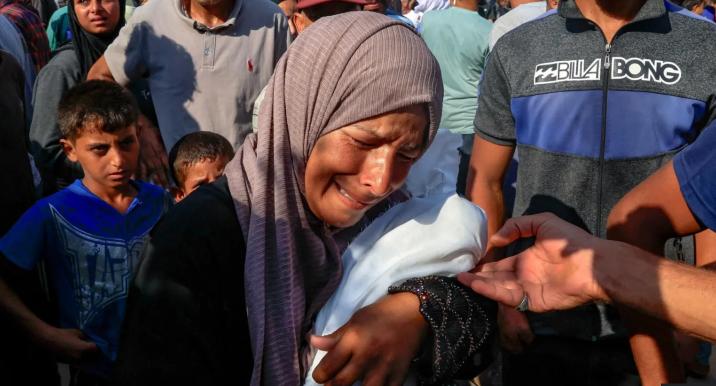UK and 27 countries call for immediate end to Gaza war

The statement comes after Gaza’s health ministry reported more than 100 Palestinians were shot dead over the weekend by Israeli forces while they waited for food, with an additional 19 succumbing to malnutrition.
A joint declaration by the United Kingdom and 27 other nations has sharply condemned Israel's ongoing military operations in Gaza, calling for an immediate ceasefire and denouncing what they termed “inhumane killings” of civilians desperately seeking food and water.
In a statement, the countries, which include France, Canada, Japan, Australia, Italy, New Zealand and Switzerland, accused Israel of a dangerous and inadequate aid delivery model that deprives Gazans of dignity and puts their lives at risk.
"The war in Gaza must end now," the foreign ministers stated, warning that the humanitarian crisis has deepened to new extremes. “We condemn the drip feeding of aid and the inhumane killing of civilians, including children, seeking to meet their most basic needs of water and food. It is horrifying that over 800 Palestinians have been killed while seeking aid."
The statement comes after Gaza’s health ministry reported more than 100 Palestinians were shot dead over the weekend by Israeli forces while they waited for food, with an additional 19 succumbing to malnutrition.
It also follows continued reports of deadly incidents near aid sites in both northern and southern Gaza, which have triggered international outrage.
UK Foreign Secretary David Lammy told Parliament that Gaza was facing a "litany of horrors" and highlighted that strikes had killed "desperate, starving children."
While announcing an additional £40 million in aid to Gaza, Lammy reaffirmed his support for Israel’s right to exist and defend itself but warned that its actions were “doing untold damage to Israel’s standing in the world and undermining Israel’s long-term security.”
The Israeli government dismissed the joint condemnation, calling it "disconnected from reality." Its foreign ministry accused Hamas of prolonging the war and spreading misinformation to manipulate global opinion.
"Instead of agreeing to a ceasefire, Hamas is busy running a campaign to spread lies about Israel," said spokesperson Oren Marmorstein.
The statement from the 28 nations also rejected Israel’s plan to relocate all 2.1 million people in Gaza to a so-called “humanitarian city” in Rafah, saying this would amount to permanent forced displacement, which is a violation of international humanitarian law.
"We are prepared to take further action to support an immediate ceasefire and a political pathway to security and peace," the statement added, widely interpreted as a potential move toward recognising a Palestinian state.
Since Israel launched its war on Gaza in response to Hamas’ October 7 attack that killed 1,200 people and resulted in 251 hostages, at least 59,029 Palestinians have been killed, according to Gaza’s Hamas-run health ministry.
International aid groups have continued to criticise the Israeli aid delivery structure.
The UN and its partners have refused to cooperate with the newly formed Gaza Humanitarian Foundation (GHF), which Israel and the US set up to distribute aid through private contractors inside military-controlled zones.
The UN says the system is unsafe and violates basic humanitarian principles.
The UN human rights office said it had documented 674 deaths around GHF aid sites since May, with another 201 deaths recorded along UN and other aid convoy routes.
Over the weekend, Gaza’s health ministry said another 39 people were killed near two GHF locations in Khan Younis and Rafah. On Sunday, another 67 people reportedly died when a crowd surged toward a UN convoy in northern Gaza.
The World Food Programme warned that hunger levels in Gaza had reached new levels of desperation, stating: “People are dying from lack of humanitarian assistance. Malnutrition is surging with 90,000 women and children in urgent need of treatment.”
Hospitals across Gaza have also sounded the alarm, saying they can no longer feed patients or staff.
Dr Khalil al-Daqran of al-Aqsa hospital in Deir al-Balah said, “Hospitals can no longer provide food for patients or staff, many of whom are physically unable to continue working due to extreme hunger.”
Residents say markets have shut due to severe shortages. "My children cry from hunger all night. They've had only a small plate of lentils over the past three days. There's no bread," said Mohammad Emad al-Din, a father of two from Gaza.
Despite the growing toll, Israeli officials maintain that the GHF system prevents Hamas from seizing supplies. Israel’s military says its soldiers have only fired warning shots to protect themselves from perceived threats at aid sites.
The UN says its ability to collect and distribute aid is hampered by active hostilities, tight Israeli restrictions, and severe fuel shortages.
On Monday, Israel’s Cogat agency said it was facilitating aid entry and accused the UN of failing to pick up 700 lorryloads of supplies at border crossings.
Chapin Fay, a spokesperson for the GHF, appealed for UN agencies to join their efforts and accused them of allowing food to rot at the border.
As calls for a ceasefire grow louder, pressure is mounting on all parties to find a lasting political solution to end the suffering.
